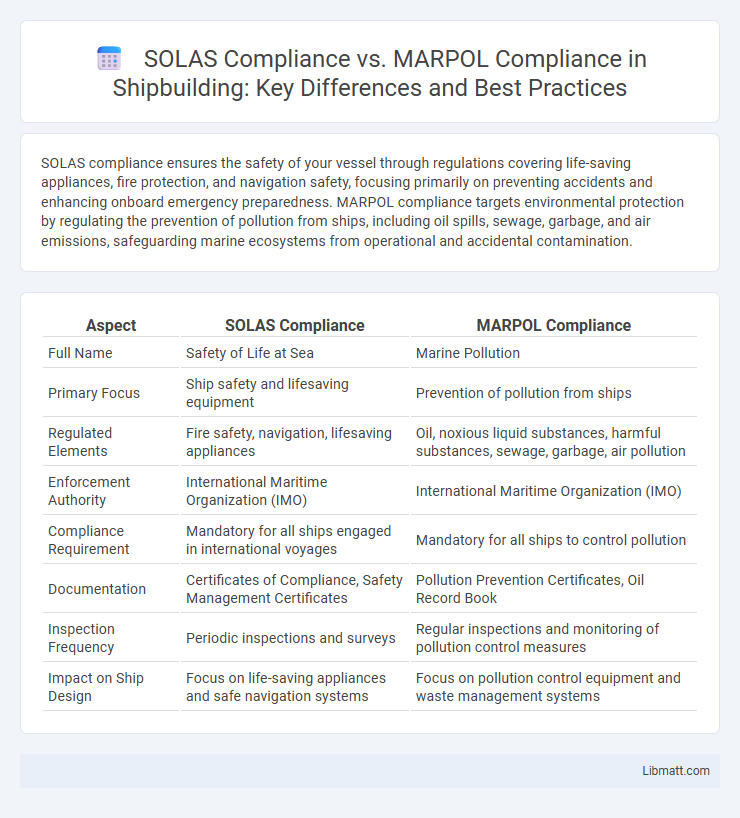SOLAS compliance ensures the safety of your vessel through regulations covering life-saving appliances, fire protection, and navigation safety, focusing primarily on preventing accidents and enhancing onboard emergency preparedness. MARPOL compliance targets environmental protection by regulating the prevention of pollution from ships, including oil spills, sewage, garbage, and air emissions, safeguarding marine ecosystems from operational and accidental contamination.
Table of Comparison
| Aspect | SOLAS Compliance | MARPOL Compliance |
|---|---|---|
| Full Name | Safety of Life at Sea | Marine Pollution |
| Primary Focus | Ship safety and lifesaving equipment | Prevention of pollution from ships |
| Regulated Elements | Fire safety, navigation, lifesaving appliances | Oil, noxious liquid substances, harmful substances, sewage, garbage, air pollution |
| Enforcement Authority | International Maritime Organization (IMO) | International Maritime Organization (IMO) |
| Compliance Requirement | Mandatory for all ships engaged in international voyages | Mandatory for all ships to control pollution |
| Documentation | Certificates of Compliance, Safety Management Certificates | Pollution Prevention Certificates, Oil Record Book |
| Inspection Frequency | Periodic inspections and surveys | Regular inspections and monitoring of pollution control measures |
| Impact on Ship Design | Focus on life-saving appliances and safe navigation systems | Focus on pollution control equipment and waste management systems |
Overview of SOLAS and MARPOL Conventions
The SOLAS (International Convention for the Safety of Life at Sea) Convention sets comprehensive safety standards for the construction, equipment, and operation of ships to ensure maritime safety and protect human life at sea. MARPOL (International Convention for the Prevention of Pollution from Ships) focuses on minimizing marine pollution caused by operational or accidental discharges from ships, covering oil, chemicals, sewage, garbage, and air emissions. Both conventions are regulated by the International Maritime Organization (IMO) and play a crucial role in fostering safe and environmentally sustainable shipping practices globally.
Key Objectives: SOLAS vs MARPOL
SOLAS compliance focuses on ensuring the safety of life at sea by regulating ship construction, equipment, and operation standards to prevent accidents and enhance crew and passenger safety. MARPOL compliance aims to minimize marine pollution through strict controls on the discharge of oil, chemicals, garbage, and air emissions from ships, protecting the marine environment. Your vessel must meet SOLAS standards to safeguard lives, while adhering to MARPOL requirements to prevent environmental damage.
Scope of Application for SOLAS and MARPOL
SOLAS compliance primarily applies to the safety aspects of merchant ships including construction, equipment, and operation to ensure life protection at sea, covering passenger ships, cargo ships, and oil tankers. MARPOL compliance focuses on preventing marine pollution from ships by regulating oil, sewage, harmful substances, garbage, and air emissions across all ship types engaged in international voyages. Both conventions are enforced internationally under the International Maritime Organization (IMO), but their scopes address distinct aspects of maritime safety and environmental protection.
Core Requirements Under SOLAS Compliance
SOLAS compliance mandates ship safety through rigorous standards including structural integrity, fire protection, lifesaving appliances, and emergency procedures to safeguard life at sea. Key requirements encompass watertight compartments, adequate lifeboats and life jackets, fire detection and suppression systems, and safe navigation equipment. Ensuring continuous crew training and adherence to safety management systems is also critical under SOLAS regulations for maintaining maritime safety.
Essential Provisions Under MARPOL Compliance
Essential provisions under MARPOL compliance include strict regulations on the prevention of marine pollution by oil, chemicals, sewage, garbage, and air emissions from ships. The convention mandates the installation of pollution control equipment such as oil-water separators, sewage treatment plants, and garbage management systems to minimize environmental impact. Regular inspections and certifications ensure vessels adhere to discharge limits and operational standards to protect marine ecosystems.
Certification Processes: SOLAS vs MARPOL
SOLAS compliance certification involves stringent safety inspections and verification of lifesaving appliances, fire protection systems, and navigational equipment, with certificates issued by the Flag State or recognized organizations. MARPOL certification requires detailed surveys and documentation of pollution prevention measures, including oil record books, garbage management plans, and sewage treatment systems, ensuring adherence to Annexes I-VI. Both certification processes demand periodic renewal and onboard audits to maintain compliance but focus on different regulatory objectives: SOLAS prioritizes ship and crew safety, while MARPOL emphasizes environmental protection.
Differences in Ship Design Standards
SOLAS compliance centers on ship design standards that enhance the safety of life at sea, including structural integrity, fire protection, and life-saving appliances. In contrast, MARPOL compliance focuses on design features that minimize environmental pollution, such as oil discharge prevention systems, sewage treatment facilities, and ballast water management. These divergent requirements influence the arrangement of ship compartments, materials used, and installation of specialized equipment.
Environmental Protection vs Safety Measures
SOLAS compliance emphasizes safety measures by establishing standards for ship construction, equipment, and operation to protect human life at sea. MARPOL compliance focuses on environmental protection, specifically preventing marine pollution from ships through regulations on oil discharge, garbage disposal, and emissions. Together, these conventions ensure both maritime safety and the preservation of the marine environment.
Challenges in Achieving Dual Compliance
Achieving dual compliance with SOLAS (Safety of Life at Sea) and MARPOL (Marine Pollution) regulations presents significant challenges due to their distinct regulatory focuses--SOLAS prioritizes ship safety and fire prevention, while MARPOL targets environmental protection through pollution control. Ships must integrate complex safety equipment and pollution prevention systems without compromising operational efficiency or vessel design. Balancing these requirements often demands advanced technologies and rigorous crew training to meet both conventions' stringent standards simultaneously.
Future Trends in SOLAS and MARPOL Regulations
Future trends in SOLAS compliance emphasize enhanced digital monitoring systems and stricter safety protocols to minimize maritime accidents and improve crew welfare. MARPOL regulations are evolving towards more rigorous emission controls and mandatory use of zero-carbon fuels to combat marine pollution and address climate change. Your shipping operations must adapt to these advancements to ensure regulatory adherence and sustainable maritime practices.
SOLAS compliance vs MARPOL compliance Infographic

 libmatt.com
libmatt.com